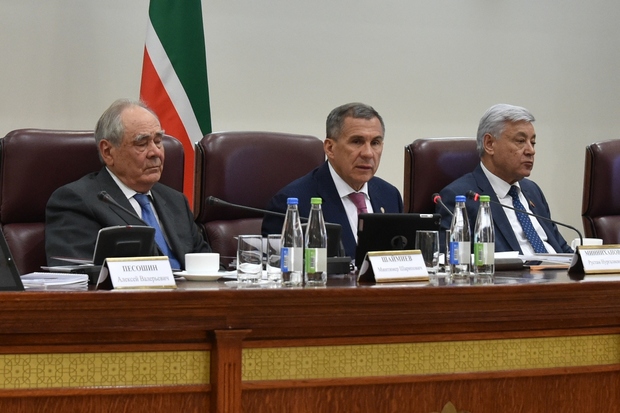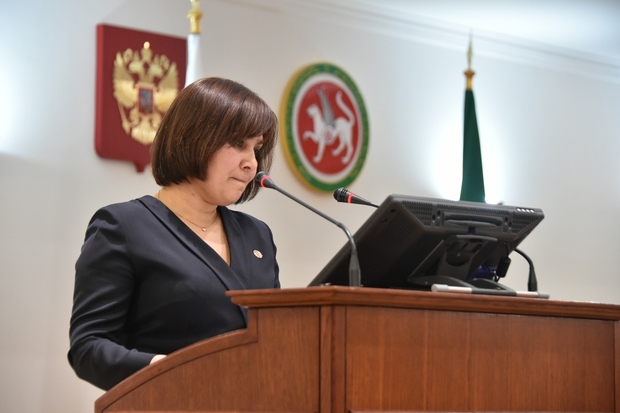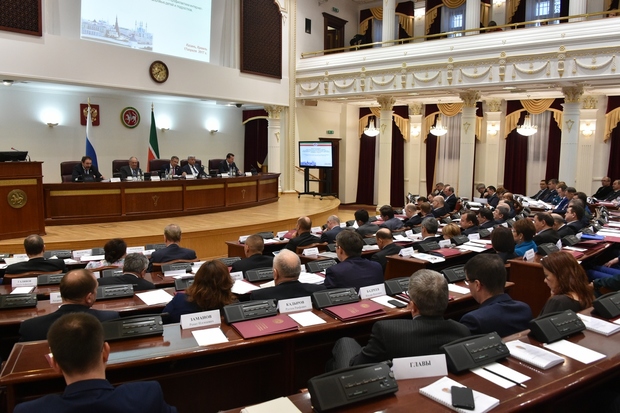Kids in the Net: a dig at Roskomnadzor, looking up to China and homework for deputies
Security Council thought how to save the young from pernicious influence of the Internet
Tatarstan Security Council gathered in the Kremlin on Monday evening. It was dedicated to three topics – fight against extremism and terrorism, policing and threat of the Internet. The first two topics were discussed behind closed doors. Journalists were offered a post-release that told that results of the fight against this evil are positive but they could not relax especially considering the upcoming international sports event this summer – Confederations Cup. The question about the influence of destructive groups in social networks on teenagers was open. Security Council presented a plan how to provide kids with media safety in the next two years. Realnoe Vremya tells the details.
Internet initiation and ''normal people'' are under threat
We need to teach how to use the Internet from kindergarten. It was an offer made by Children's Ombudsman in Tatarstan Guzel Udachina. According to the report, people's consciousness is digitalised, and kids start to use the Internet at a younger age. Speaking simply, if 7 years ago the first acquaintance with the Net was at the age of 10, now they do it aged 2-6. Suicidal and other destructive groups in social networks is the number one topic when speaking about kids on the Internet. Baddies prefer to wash kids' brains precisely in social networks because there is an opportunity to create a private community, Guzel Udachina led to the experience of the countries that limited registration age in social networks. In the USA, it is 13 years. These days State Duma deputy Vitaly Milonov adopted a bill to limit the presence of kids under 14 years in social networks and launch signing in with a passport.
It is unclear how it will help if, as Rustam Minnikhanov says, not only kids but also adults are affected by bad sites.
''On the one hand, we are open, get information. Everything is good. We can't live without it. On the other hand, kids understand it in their own way, and this threat exists. Even adults are under the great influence. Getting distorted information, normal people are under threat,'' Minnikhanov said.

Rustam Minnikhanov: ''On the one hand, we are open, get information. Everything is good. We can't live without it. On the other hand, kids understand it in their own way, and this threat exists''
To close like China but reveal physician–patient privilege
The situation with suicides in Tatarstan is not awful like in Russia in general. In 2016, Tatarstan had 13 suicides among teenagers (by the way, it has been the smallest number in the last 6 year: for instance, the number was 27 in 2001 and 23 in 2014). None of them was committed under the influence of groups in social networks. Statistics on uncompleted suicides cause alarm – they comply with the law on physician–patient privilege.
''Law on physician–patient privilege that limits health centres to give information about a patient is a significant obstacle for this work. We offer to make amendments to the federal law if it is necessary,'' Udachina offered.
Nowadays the State Duma has not started to consider another anti-suicidal law presupposing responsibility of creators of destructive communities on the Internet that push people to suicides. Now the fight against them is limited to a ban. But it is useless – another 3,000 new pages in 1,000 banned pages appear.
''When we close sites, we fight against windmills. We need to close proxy servers, global firewalls and so on – like in China. When we block, we send the Ministry of Internal Affairs a link, they identify people. But when we identified them, we see there is no criminal responsibility [for creators of sites and communities], Tatarstan Prosecutor Ildus Nafikov supported the bill adopted by Irina Yarovaya.

Guzel Udachina: ''Law on physician–patient privilege that limits health centres to give information about a patient is a significant obstacle for this work. We offer to make amendments to the federal law''
A dig at Roskomnadzor and work for deputies
Banning sites and communities is not easy. There was a dig at the Federal Service for Supervision of Communications, Information Technology, and Mass Media (Roskomnadzor). The service detected 50,000 of suspicious pages within two years, while the Tatarstan prosecutor office did over 8,000. The prosecutor office works more efficient, said Guzel Udachina and recommended Roskomnadzor to be more active in search of suspicious content. Ildus Nafikov formulated the request better.
''They need to modernise their work, they are overwhelmed with requests. We start detecting and sending them while they say: ''You have showered us, we can't get anything done,'' the Tatarstan prosecutor told.
Minnikhanov wanted Boris Razin, director of Roskomnadzor in Tatarstan, to stand up but he was absent. His deputy had to carry the can. But in fact, he had nothing to justify for:
''Who blocks: ours or Moscow?'' Rustam Minnikhanov asked.
''Moscow,'' the Roskomnadzor representative answered.
''How much time does it take?''
''10 days.''
''10 days? It is not fine. A signal needs to be blocked during the day as soon as it appears. Our power is limited – we can't close. We don't have the equipment to find the organiser of this disorder. Let's take the initiative,'' Minnikhanov offered to set Tatarstan deputies in the State Duma a task to solve the Internet safety problem. ''There are 15 deputies in the State Duma – it is their job. Everybody in Moscow shouts, but there are not actions. There will be more further on– the world is getting more open. If there is no registration, responsibility for people, if it is like today, it is a big problem around the world, not only in Russia.''

Extra-curricular activities are important, but blocking and punishing are more important
The project of a plan on media security provision for kids from 2017 to 2019 was the result of the reports. Corresponding structures were set tasks to intensify cooperation and increase efficiency while detecting forbidden Internet content. The Ministry of Education was set a task to deliver the information about the ''destructive influence of Internet materials'' to parents and kids. It means themed teacher-parent meetings are expected in the short run. Tatmedia agency was to organise a ''large-scale campaign on informing the population about the forbidden content''. The rest needed to prepare offers to make in federal authorities.
A necessity to take additional measures that will distract children from the virtual world was made public: to increase the availability of extra-curricular activities and sports classes, especially to pay great attention to kids from the risk group – who are in a difficult life situation, orphans, disabled kids. This topic was called important. In the Security Council participants' opinion, only preventive measures won't have a due result. Change of laws is the key solution – blocking suspicious communities and punishing their organisers.